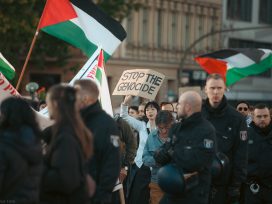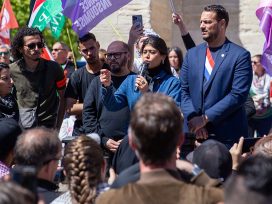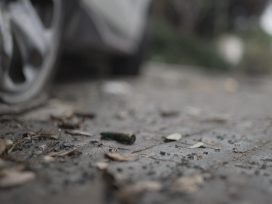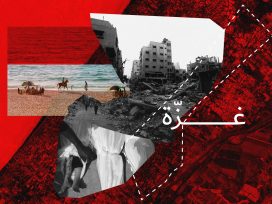Offending colonial sensibilities
In 2022, Shahd Abusalama, a Palestinian academic working in the UK, was suspended from her teaching position on antisemitism charges. Here she recalls the defamation campaign against her and discusses how her case reveals the structural vulnerability of Palestinians in the West.
The ongoing genocide in Gaza has galvanized a persistent, creative and disruptive global uprising for Palestine, including workers and activists shutting down arms factories and disrupting trade, and youth-led university encampments and national protests. Yet this dynamic movement in response to Israel’s relentless mass killing, devastation and displacement of Palestinians in Gaza since 7 October 2023 has been met with increasing systematic repression. In contravention of all democratic standards, students and staff have faced vilification, police brutality and arbitrary detention in the USA, the UK and numerous other European countries.
Palestinians in the West are subjected to endless campaigns of defamation and censorship that seek to silence opposition to Israel’s systematic oppression of Palestinians. We are criminalised and hounded for celebrating our existence, sharing our experiences, challenging distortions of our history and image, and expressing our aspirations for freedom, justice, equality and return.
This has been my experience in the UK, too. Aware of the Israel lobby’s attempt to make an example of me to intimidate people, especially Palestinians, I refused to be silenced. I spoke truth to power, exposing the malicious activities of those complicit in enabling and legitimising Israel’s manipulations of reality in order to escape accountability and consolidate its domination of the Palestinian people.
It is worth underscoring that this account deals with only one example in a long line of anti-Palestinian racialised smears against me, constituting a prolonged campaign of harassment, which started when I first enrolled as a PhD student at Sheffield Hallam University (SHU) in 2018. I continue to be targeted by malicious narratives rooted in racism, Islamophobia and denial of Israeli crimes, all while my family survives Israel’s genocide in Gaza.
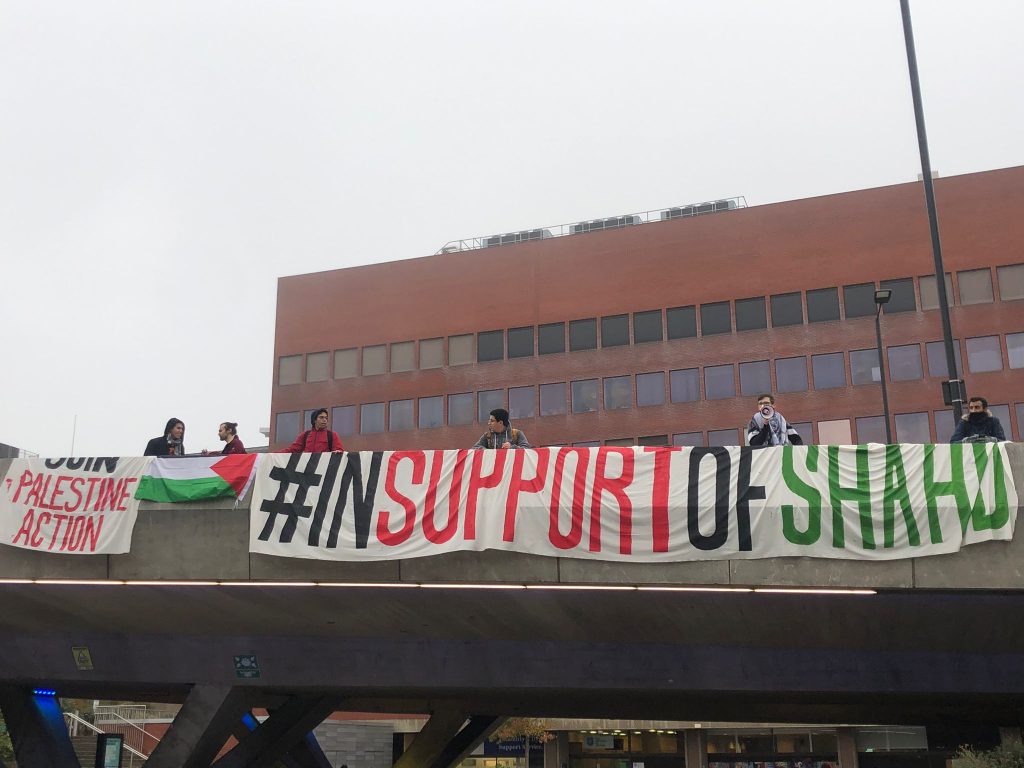
Banner in support of Shahd Abusalama at Sheffield Hallam University, 29.11.2022. Source: @Mancs_CP / X
In the US and across Europe, far-right politics are on the rise, only reinforcing the longstanding politics of selective solidarity. The ethnic cleansing of Palestinians would not be able to continue without western military, diplomatic and ideological support, reflected in biased mainstream media that favour Israeli narratives and systematically silence Palestinians. If we don’t collectively unite to work against this increasingly fascist state of affairs, none of us will be safe.
A test-case for anti-Palestinian censorship
I was born in Jabalia Refugee Camp, occupied Gaza, after my grandparents’ expulsion from their villages of Beit Jerja and Isdud during the 1948 Nakba, which condemned us to a life of oppression under Israeli occupation. We grew up instinctively resisting in multifaceted forms; indeed, our mere existence on the land was an act of resistance.
After surviving multiple Israeli military attacks on the besieged Gaza Strip, I left in 2013 to further my higher education in Media Studies. I obtained a Masters at the School of Oriental and African Studies, University of London, before taking up a PhD at Sheffield Hallam University (SHU), where I completed my dissertation between 2018 and 2021.
As a high-profile Palestinian artist, author and campaigner for Palestinian rights, I became the target of the Israel lobby in the UK. When I announced my new position as an Associate Lecturer at SHU on my personal social media, an organised smear campaign was launched to protest my appointment, indicating that my digital presence was being closely monitored.
I am the first Palestinian scholar in the UK to have been used as a test-case for the application of the International Holocaust Remembrance Alliance (IHRA) definition of antisemitism. This much criticized definition conflates the crime of antisemitism with the legitimate criticism of Israel to protect and maintain the settler-colonial Jewish state and its politics of apartheid. The IHRA definition is inherently racist because it denies Palestinian struggles under Israel’s oppressive practices and structures, which consistently expose Israel as ‘a racist endeavour’ – an objective description that the IHRA definition would regard as antisemitic.
For over a decade, the Euro-American Israel lobby has pressured civil society institutions, including universities, to adopt the IHRA definition. In 2020, then UK Secretary of State for Education Gavin Williamson threatened universities with funding cuts if they refused to adopt it, ignoring opposition from intellectuals, lawyers and anti-racist multifaith groups. Even the definition’s main drafter, Professor Kenneth Stern, condemned its weaponization to suppress political speech, warning that its application on university campuses would ‘harm not only pro-Palestinian advocates, but also Jewish students and faculty, and the academy itself’.
Nonetheless, Zionist outlets and groups, infamous for targeting critics of Israel and mitigating its image crises, invoked the IHRA definition to frame me as antisemitic. The smear campaign began with an article by the Jewish News (JN), published on Christmas Eve 2021. Citing SHU’s controversial adoption of the definition that year, JN accused me of antisemitism for defending a first-year undergraduate student who had risked disciplinary action for displaying a placard featuring the phrase ‘Stop the Palestinian Holocaust’. As SHU closed its doors for the holiday season, I was left alone in great distress.
No stranger to Israel’s tactics of suppression, I initially informed solidarity groups I worked with of a potential attack on me. I refused to allow my life to be disrupted, finalising and submitting my PhD Dissertation by New Year’s Eve. I was excited to start teaching Postcolonial Media Culture to third-year media undergraduates at SHU. Little did I know that my university would bow to such blatant harassment.
After delivering an introductory lecture to my students on 17 January 2022, and just before teaching my second class of the week, I was shocked to receive an email from my department informing me that I had been suspended until further notice, following an investigation of a ‘complaint’ against me. This confirmed the worries that had haunted me throughout the holiday season of 2021–22: that the University would capitulate to mounting smears from pro-Israel organisations in the UK, including JN, Campaign Against Antisemitism and the Jewish Chronicle, Camera UK and GnasherJew.
My (now former) employer neither informed me of the nature of the complaint nor of the investigation process. I was not told what the timeline would be, nor when I would have a right of reply. All of this breached employment law. The fact that I learned from external, pro-Israel sources of the complaint that led to my suspension without prior notice shows the structural vulnerability I was dealing with. I was targeted not only as a ‘Gaza-born’ Palestinian refugee in the UK with a then-precarious legal status, but also as a worker afforded few protections under UK employment law.
Fighting back
Objecting to the framing of Palestinians’ mere existence and visibility as a threat, I fought back loudly. Support poured in from all corners of the world, protesting SHU’s unprecedented treatment of me. Exposing the structural vulnerabilities facing Palestinians in the West, my story encouraged a vibrant and global network of solidarity around me #InSupportOfShahd.
While alternative media, artists, academics, political figures, human rights groups and cultural organisations worldwide spread the news on social media, legal advisors from the European Legal Support Center, the University and College Union and other trade union activists protested the university’s actions, calling on SHU to reverse the adoption of the IHRA definition. Simultaneously, students and staff at SHU mobilised on and off campus, and countless others of multi-faith backgrounds filled the university management’s inboxes with letters in my support, showing the malicious allegations against me to be baseless and politically motivated.
The university was embarrassed and forced to reverse course. Within two weeks I was reinstated, in what was widely claimed as a victory to the movement for Palestine. The university’s reassurances, however, soon proved disingenuous. Zionist media attacks against me grew in intensity and viciousness, hoping to crush this victory. Soon after I finished teaching the semester, I was subjected to yet another unjust investigation at SHU, based on similar grounds. This is a strategy repeatedly used to intimidate and exhaust Palestinians and their allies, and to prevent us from pursuing freedom and justice.
After nearly a year-long struggle, during which I was repeatedly harassed, then investigated and ultimately exonerated, I was eventually hounded out of SHU. At this moment, the real purpose of the IHRA definition became clear: it is less about protecting Jews and more about protecting Israel by silencing Palestinians and advocates for justice in Palestine.
I attended my graduation ceremony with a heavy heart on 17 November 2022, the week after the Jewish Chronicle had published an article citing derogatory assertions made about me by SHU. Instead of defending its own processes that had vindicated me, the SHU defamed me, violating both confidentiality and a settlement agreement we had recently reached. I continue to fight a legal battle against my former employer, hoping to hold it accountable for the reputational, psychological, and professional damage it caused me, and to ensure no one else is silenced on the basis of their identity or for daring to protest injustice.
Media complicity in the Gaza genocide
I was by no means the only scholar who has faced increasing smears and silencing during the genocide in Gaza. On 11 October, I woke up to find my picture published by The Times, in a defamatory and misleading article headlined ‘Revealed: the British academics defending Hamas’. While the non-Palestinian academics targeted in the piece received press requests, the paper ignored basic journalistic ethics and skipped over my right to reply. The subtitle stated that ‘Jewish students report feeling unsafe on campus’, reinforcing a dangerous and polarising narrative that misleadingly paints all Jews as Zionists and all Palestinians as terrorists, or ‘human animals’ – to use the dehumanising references made by Israeli leaders enabling the genocide in Gaza.
The complicity of western media in the Gaza genocide cannot be understated. A military superpower with nuclear weapons like Israel that is supported by even mightier armies like the USA, UK and Germany could hardly be threatened by a besieged enclave like Gaza. While constantly invoking the memory of the Holocaust and repeating Israel’s framing of Hamas as ‘terrorist’ and ‘genocidal’, western media omit any reference to the foundational principle of the state of Israel: that of the consistent and gradual elimination of the Palestinian natives. This elision intentionally conceals and undermines the genocidal intent of Israeli ethnic cleansing in Gaza, despite its increasingly indisputable nature, which has prompted South Africa to take Israel to the International Court of Justice in the Hague.
By omitting this longstanding history of relentless and well-documented collective punishment campaigns against besieged Gaza, western mainstream media enabled Israel to claim 7 October as the starting point of history. ‘There was a ceasefire on 6 October’ is one of the most repeated Zionist myths, which couldn’t be more reflective of the denial of the Palestinians’ longstanding struggles under military occupation and settler-colonialism. Such discourse, which frames opposition to Israeli crimes as a question of ethno-religious identity rather than a question of politics, attempts to demonise and silence academics who speak up for Palestine and refuse to ignore the historical context that precedes 7 October.
Zionist media has shown no sympathy for my background as a survivor of the Israeli Occupation’s collective punishment policies, nor for my experience of a decade of exile, during which I watched my family and other Palestinian communities be repeatedly dehumanised, terrorised, displaced, killed and maimed. None of the well-reported offences and internationally-recognised war crimes and crimes against humanity openly committed by Israel offended their colonial sensibilities. Yet my defence of a placard reading ‘Stop the Palestinian Holocaust’ was offensive and allegedly made ‘Jewish students feel unsafe on campus’!
Looking back, as Gaza, my city of birth, burns and loved ones endure a genocide through bombs, starvation and the destruction of all means of survival from North to South, the viciousness of the Zionist smears couldn’t be more blatant. This incident and the subsequent struggle I endured has often been triggered in recent months. The word ‘Holocaust’ is often used by Palestinian survivors to describe the terror inflicted on their families, homes and livelihoods. This included Israel setting fire to homes, farmlands, bakeries, and even tents, most infamously in Rafah on 26 May 2024.
My own family home was bombed three times before it was finally set on fire around the turn of the year, devastating news my family still finds hard to process. The maddening part is that a segment of this unliveable home had been appropriated as a shelter for desperate family members left with nowhere to go after the re-invasion of Jabalia Refugee Camp in May 2024.
Would you blame a Palestinian for using the word ‘Holocaust’ to bring attention to the ongoing genocide that rages on with more intensity and brutality, even after nine months of constant bloodbath, mass devastation and displacement?
Editors’ note: The views expressed in this article do not necessarily reflect those of the editors, nor of Eurozine as a whole. In particular, while acknowledging the existence of hyper-partisan pro-Israeli media, the Eurozine editors reject notions of a wider ‘Zionist’ influence in the media. More broadly, Eurozine continues to abhor all violence committed against civilians in the current war, whether in Israel, or in Gaza and the West Bank.
Published 24 July 2024
Original in English
First published by Eurozine
© Shahd Abusalama / Eurozine
PDF/PRINTNewsletter
Subscribe to know what’s worth thinking about.
Related Articles
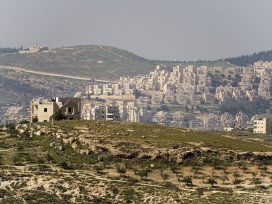
The two-state solution is often seen as empty talk. But it is the only alternative that offers a realistic prospect of peace in Israel-Palestine and the wider region. Putting it into practice will require not only genuine, detailed discussion, but above all a fundamental shift of mindset.
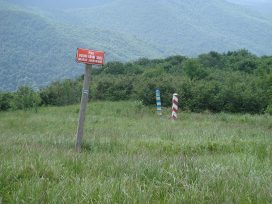
Ukrainian journalists, acting as responsible citizens, prioritize caution over breaking news in support of the war effort. But when does vigilance become self-censorship? And how far is this tendency being manipulated for military gain? Independent media outlets, making their voices heard, defy top-down decision-making.
